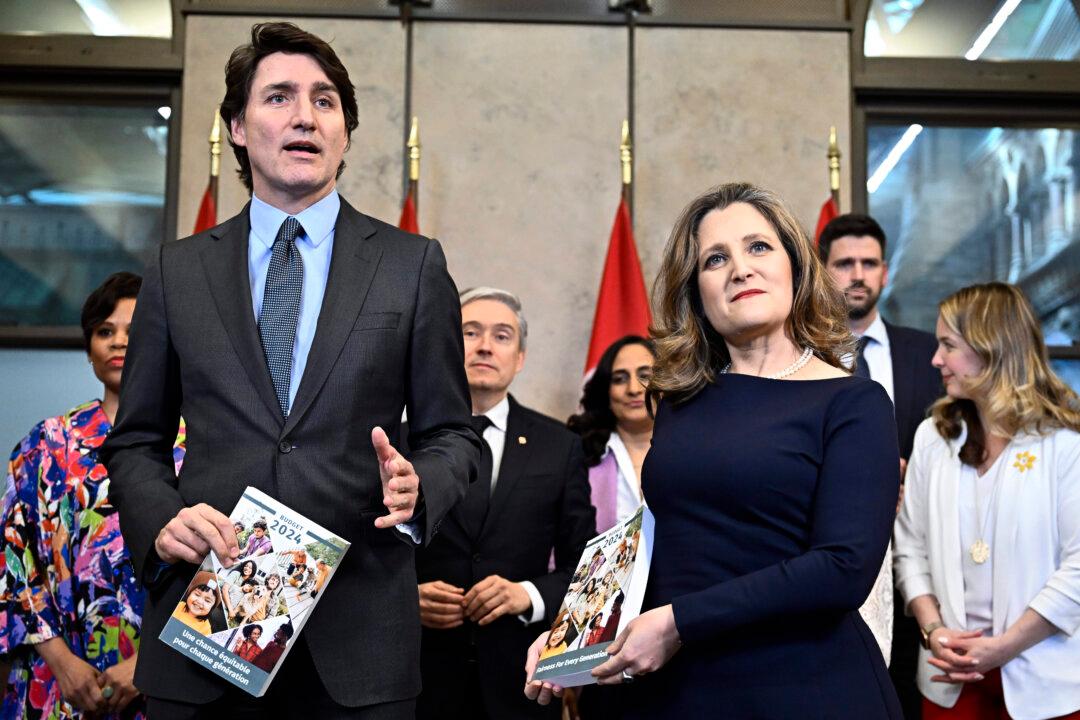Chrystia Freeland’s recent budget was another assault on investment in Canada, which is the chief engine of economic growth and therefore of per capita income and wealth of Canadians.
The budget projected a deficit of $40 billion in 2023-24, followed in the succeeding year by a dramatic reduction to $39.8 billion, and similar tokenistic reductions in the succeeding two years. This is from the government whose opening gambit on the subject of deficits was that they cure themselves, as if the level of federal spending and the ambience for investors could be presumed to rise to absorb any deficit, and the federal government had a blank cheque to chase the votes it wished with the targeted incentives it chose to make, no matter where the arithmetic led.
This seems to achieve the political free lunch of bringing in over $20 billion while inconveniencing a very small percentage of people. It ignores the fact that ultimately corporations are people, and the burden will be felt by the shareholders of the affected corporations. Ever since Margaret Thatcher and Ronald Reagan successfully cut taxes in the UK and United States there has been a focus on what are widely called stealth taxes, that do not immediately affect the income of individuals; a profusion of user fees and taxes on aggregations of people but not personal incomes have been resorted to, and fiddling up the inclusion rate for corporations is a just another method for taxing people in a way that they will not immediately notice.
The principal gesture to deal with the massive housing crisis that the government has generated is to increase from 4 percent to 10 percent the capital cost allowance temporarily for categories of new rental projects. This is not offensive in itself, but it is completely inadequate to generate the increase in housing supply, which is now so scarce that the average residential unit in Canada is over 40 percent more expensive than in the United States, even though the per capita income of the United States is around $18,500 higher than it is in Canada (a margin that has doubled under this government). Given the proportions of this crisis, a serious plan of incentivization should have been launched long ago to promote greater housing construction.
Where the budget has gone cock-a-hoop, very predictably, is in pursuit of the government’s insane environmental objectives. A 15 percent refundable tax credit is being made available for adequate investments in solar, wind, or water energy; production of solar energy equipment; generation of electricity from nuclear fission; geothermal energy (as long as it doesn’t extract fossil fuels for sale); energy generated from specified waste materials; electricity storage and transmission equipment provided no fossil fuel is involved; equipment for delivering natural gas used to generate electricity or heat; and equipment used to export electrical energy. Electric vehicles are naturally tax-favoured.
Some of these recipients are undoubtedly deserving, but the program is tainted by the suicidal federal government’s adoration of alternate energy and its resulting unholy war on Canada’s greatest industry—oil and gas—for which the world is clamouring. We should be increasing our production of fossil fuels and not reducing it. We should not pay one cent for the production of alternate energy that is grossly more expensive than fossil fuels.
Let us one more time contemplate the inconvenient energy catechism: climate change is not outside normal historic cycles, and we have no idea of the extent, if at all, by which human conduct affects climate change. The great majority of fossil fuel production is by countries that do not accept and will not abide by the environmental notions that motivate Canadian official conduct.
Canada contributes approximately 2 percent of the world’s carbon footprint and nothing we do in this country will have the remotest impact on what happens in the world. This is a gas-lit, virtue-signalling displacement activity inflicting great economic hardship on Canada at no gain whatever to the planet. It is mad. We should lead the world in climate research and reduce pollution as far as we can without inflicting severe hardship on the population, and we should stop financing these ridiculous boondoggles which are recognized to be nonsense, particularly by the chief recipients of the incentives for solar energy.
This vast offensive to get on top of all activities and transactions of all people has ostensibly been undertaken to fight money laundering. It is really a manifestation of the rabid zeal of all governments to collect as much revenue as they can from the public they supposedly serve because they are such inept administrators that no matter how much money they take in, they cannot help themselves from spending much more than that in pursuit of their dubious objectives, which range from Davos-plans of wealth redistribution to the banning of fossil fuel. This is always in the declared interests of equity equally for everyone, apart from the vast apparatus of those who inflict this uniformity and monotony upon us: a mighty legion of officious and authoritarian busybodies who in their scale and lust to rule surpass the combined imaginations of George Orwell, Franz Kafka, and Arthur Koestler.
Canada’s average rate of tax is 45 percent of the income of the average family. It will be a lengthy process, but eventually the taxpayers will cease to tolerate the oppressions of the tax collectors. The 2024 federal budget was a short step towards that day of reckoning.






